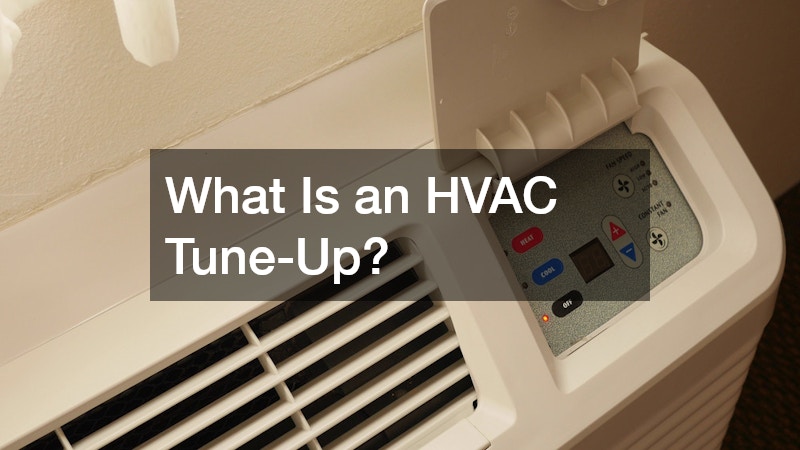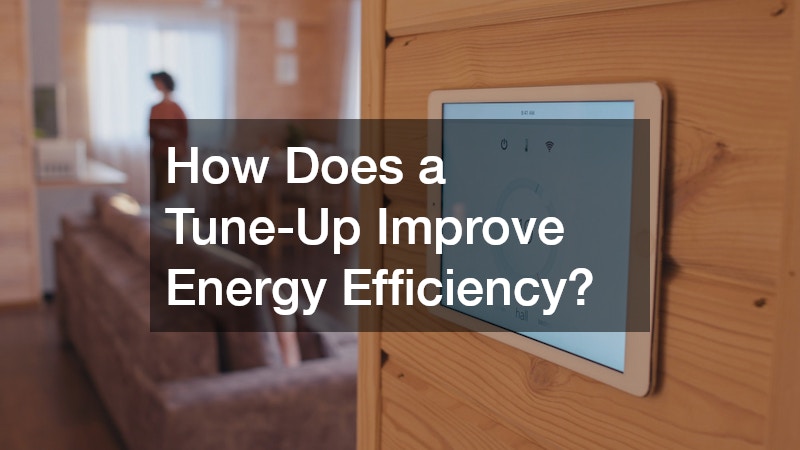Keeping your home’s comfort system running smoothly isn’t something most people think much about until the temperature swings and the equipment suddenly struggles to keep up. That’s exactly why an HVAC tune-up matters. A well-maintained system simply performs better, lasts longer, and burns less energy, making it one of the most practical investments a homeowner can make. During a tune-up, the technician’s job is to look beyond quick fixes and check how the heating and cooling components interact as a whole. That includes airflow, efficiency, safety testing, and anything that could lead to breakdowns if ignored.
The process also creates a moment to evaluate how well your current setup fits your home’s demands. Maybe it’s time to think about ac installation upgrades, or maybe you’ve been relying on ac repair a little too often. An HVAC contractor can catch those trends early and help you make smart choices before you’re facing a no-cool emergency on a 100-degree day. Regular tune-ups aren’t just a “nice to have.” They help prevent bigger problems, reduce the workload on major components, and ensure your air conditioning and heating systems stay reliable when you need them most. Understanding what’s actually involved gives homeowners the confidence to spot quality service, ask good questions, and recognize whether they’re hiring the right air conditioning contractor or local hvac companies for the job.
What Is an HVAC Tune-Up?

Definition of HVAC Tune-Up
An HVAC tune-up is a structured maintenance service designed to evaluate the condition, performance, and safety of your heating and cooling equipment. The technician checks the system from top to bottom—everything from airflow measurements to electrical components—and makes adjustments where needed. A proper tune-up looks at how efficiently the system is running, whether any parts are wearing out, and what might cause performance issues down the line.
It includes cleaning, tightening, lubricating, testing, and verifying that all components are working together as they should. When done correctly, it prevents the type of problems that lead homeowners to call for emergency ac repair or rush into ac installation because the system unexpectedly failed. Since HVAC systems handle both temperature control and ventilation, a tune-up keeps indoor comfort stable while also maintaining healthy airflow throughout the home.
Importance of Regular Maintenance
Routine tune-ups are essential whether you need residential or commercial heating repair because HVAC systems naturally lose efficiency as dust, debris, and mechanical wear accumulate. Even small issues—like a partially clogged filter or low refrigerant—can make the unit work harder than necessary. Over time, that strain translates into higher energy bills, louder operation, and more frequent repair calls. Regular maintenance from a qualified HVAC contractor reduces those risks and helps the system reach its expected lifespan.
What Components Are Inspected During a Tune-Up?
Key Components To Check
A thorough tune-up targets the major components that influence efficiency, airflow, and temperature regulation. Filters, evaporator coils, condenser coils, and blower motors all play a big role in system performance, so they’re cleaned, checked for damage, and evaluated for wear. The technician also inspects electrical connections, safety switches, and thermostats to confirm everything is functioning as intended.
Ductwork is another area that deserves attention. Even small gaps or blockages can cause comfort issues, wasted energy, and uneven cooling throughout the home. Ensuring the ducts are properly sealed and delivering airflow efficiently can help extend the time between ac repair visits. The goal is to catch developing issues early so the air conditioning and heating equipment don’t work harder than they should, reducing strain and improving performance.
Visual vs. Technical Inspection
A visual inspection identifies obvious issues—dust buildup, corrosion, loose wires, or blockages in and around the system. It’s the first step in understanding the overall condition. However, a technical inspection goes deeper and involves tools and diagnostic testing that only trained HVAC professionals can perform. This may include measuring voltage, checking refrigerant pressure, testing capacitors, and verifying airflow levels.
How Often Should You Schedule Tune-Ups?

Recommended Frequency
Most experts recommend scheduling an HVAC tune-up twice a year—once before cooling season and once before heating season. This ensures both sides of the system get professional attention before they’re pushed to their limits. Spring tune-ups focus on air conditioning performance, while fall visits prepare the heating components for colder weather.
Seasonal Considerations
Seasonal timing matters because HVAC systems experience different types of stress depending on the weather. In summer, the air conditioning components work continuously, while winter forces the heating side to run harder. A tune-up at the right time helps each part operate efficiently when demand is highest.
What Specific Tasks Are Performed During a Tune-Up?
Cleaning and Changes
Cleaning is a core part of any tune-up. Dust and debris buildup on coils, blower components, and vents can restrict airflow and make the system run harder. During the visit, the technician clears these areas to restore proper circulation and efficiency. Filters are checked and replaced as needed, ensuring clean air passes through the system without straining the equipment.
Other routine tasks include lubricating moving parts, tightening electrical connections, and checking for signs of wear that could lead to more serious problems. These small steps play a big role in preventing future ac repair needs and keeping the air conditioning equipment functioning at peak efficiency. When cleaning and part replacements happen consistently, the system stays far more stable year-round.
Performance Testing
Performance testing verifies that the system is operating the way it should under normal conditions. The technician measures airflow, tests refrigerant levels, checks thermostat accuracy, and monitors temperature differences across the system. These readings help identify hidden issues like airflow blockages, failing capacitors, or refrigerant leaks.
Testing also ensures the equipment isn’t wasting energy or working harder than necessary. If a problem is found early, it’s usually cheaper and easier to fix—reducing the chance you’ll need sudden ac installation decisions or urgent calls to ac contractors. Performance testing is one of the best tools an HVAC contractor has to maintain reliability, prevent system strain, and support long-term efficiency improvements.
How Does a Tune-Up Improve Energy Efficiency?

Identifying Issues
One major benefit of an HVAC tune-up is early detection of efficiency-stealing issues. Even something simple, like a dirty coil or an obstructed filter, can force the system to use more energy than needed. Over time, these problems multiply and lead to higher utility bills and unnecessary ac repair calls.
Identifying issues early helps keep airflow steady and reduces mechanical strain. A technician trained in heating and air services can pinpoint small inefficiencies that homeowners would never notice on their own. Fixing these problems promptly ensures the air conditioning and heating systems stay balanced and don’t drift into expensive or energy-draining patterns.
Optimizing System Operation
A tune-up fine-tunes the entire system so it operates as efficiently as possible. Adjusting fan speeds, calibrating thermostats, sealing airflow leaks, and confirming proper refrigerant levels all contribute to smoother operation. When everything works in harmony, the system doesn’t run longer than necessary to reach your desired temperature.
This optimization helps the equipment last longer, reduces monthly energy costs, and prevents excessive wear that could lead to emergency service calls. Local hvac companies often include these adjustments in their maintenance plans to help homeowners stay ahead of problems. When the system is optimized correctly, your air conditioning remains stable through heavy use, and your heating components perform reliably even in cold weather.
What Are the Costs Associated With HVAC Tune-Ups?
Breakdown of Costs
The cost of an HVAC tune-up can vary depending on the service provider, system size, and whether additional repairs are needed. Typically, a standard visit includes cleaning, performance testing, and general system evaluation. Most homeowners can expect a base fee that covers labor and inspection, with extra charges only applying if replacement parts or additional tasks are required. Some HVAC contractor teams offer tiered service packages, which bundle routine visits, priority scheduling, and discounts on ac repair or ac installation if a system eventually needs larger updates.
Value for Investment
The upfront cost of a tune-up pays off through fewer repairs, better efficiency, and improved comfort. When a system is cleaned, adjusted, and inspected regularly, it doesn’t have to run as long or as hard to maintain the right temperature. That translates directly to lower monthly energy bills and reduced wear on internal parts. Homeowners often find they need far fewer calls for heating and air services throughout the year when they stay consistent with maintenance.
What Should You Expect From Your HVAC Technician?

Qualifications and Certifications
A reliable technician should bring the proper training, licensing, and certifications to handle both heating and cooling systems safely. Many professionals hold credentials from organizations that set high standards for service quality and technical knowledge. When choosing someone for your HVAC tune-up, it’s smart to ask about certifications and experience with both residential air conditioning and heating components.
Technicians with strong qualifications are better equipped to identify subtle issues and prevent the need for repeated ac repair calls. They understand how to test refrigerant, assess airflow, and ensure the system meets current safety guidelines. Local hvac companies often highlight their technicians’ qualifications so homeowners can feel confident in their choice. The right professional knows how to approach every part of the system, from routine checks to complex diagnostics, and can communicate clearly about any findings or recommendations.
Professional Behavior and Communication
Beyond technical skills, a technician’s professionalism and communication style significantly impact the experience. A good air conditioning contractor or HVAC contractor should arrive on time, treat your home respectfully, and explain what they’re doing in clear, straightforward terms. They should walk you through the results of the inspection, outlining any suggested repairs or adjustments so you understand what’s necessary and why.
Professional behavior also includes honesty—meaning they don’t push unnecessary upgrades or pressure homeowners into immediate decisions. They should answer questions openly, offer maintenance tips, and help you understand how to avoid problems that might lead to urgent calls for heating and air services or ac contractors later. When communication is strong and transparent, homeowners feel more comfortable and informed throughout the tune-up process.
How to Prepare for Your HVAC Tune-Up Appointment?
Pre-Visit Checklist
Preparing for a tune-up doesn’t take much effort, but a few simple steps can make the appointment smoother and help the technician work efficiently. Clearing access to the indoor and outdoor units is the first step—items like storage boxes, lawn tools, or furniture can block airflow or make it difficult for the technician to reach the equipment. Ensuring the thermostat is working correctly and replacing batteries if needed also helps streamline the visit.
It’s also wise to jot down any recent issues you’ve noticed: unusual noises, changes in airflow, warm spots, or frequent cooling problems that might have made you consider ac repair. Mentioning these details gives the technician a starting point for diagnosing potential issues. Homeowners who stay proactive often catch problems earlier, avoiding bigger fixes or premature ac installation down the road. The more prepared you are, the more thorough and efficient the tune-up becomes.
Homeowner’s Role During the Appointment
During the appointment, homeowners don’t have to hover, but being available for questions can help the technician complete the service effectively. Sometimes a technician needs access to specific areas, like the breaker panel, attic, or thermostat settings. Staying nearby ensures those moments don’t delay the process. You can also ask questions about efficiency, equipment age, and signs that future repairs may be needed.
A tune-up is a chance to learn how your system is performing and what steps you can take to extend its life. Many people discover small adjustments—like changing filters more regularly or improving ventilation—can have a big impact on system stability. When you’re engaged, you’re better prepared to avoid unexpected calls to local hvac companies or ac contractors for urgent issues. Being present but not intrusive strikes the right balance.
An HVAC tune-up is one of the most practical steps homeowners can take to protect their comfort systems, reduce energy waste, and avoid expensive repairs. By understanding what the process involves, you’re better equipped to recognize high-quality service and choose a trustworthy HVAC contractor or air conditioning contractor who will maintain your equipment with care. Each visit includes cleaning, testing, inspection, and adjustments that work together to keep the air conditioning and heating elements functioning smoothly.
